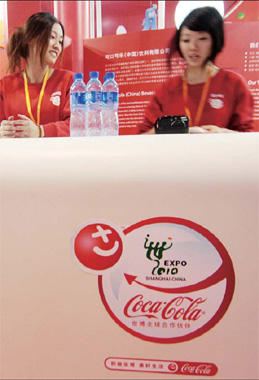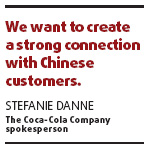A giant sculpture of a brain cell sits on a pedestal in the center of a green house made of glass and steel, signifying process through innovation. That is the theme of the Belgian-European Union pavilion for next year's Shanghai Expo.
|
 Coca-Cola shows its products in Beijing last month . The exhibit was part of the company's marketing campaign for the expo. [China Daily]
Coca-Cola shows its products in Beijing last month . The exhibit was part of the company's marketing campaign for the expo. [China Daily] |
The idea is merely a sketch on paper at the moment. But come May, the 5,000-sq-m structure in the center of the expo garden will be one of some 50 pavilions representing Western nations competing for a stronger presence in the Chinese market.
"The expo will be a great chance to strengthen political, economic and cultural relationships between China and the various participants," said Marie Benassi, deputy general-commissioner of the European Union pavilion.
The six-month gala is expected to draw 70 million visitors, mainly Chinese. As such it presents an unprecedented opportunity for Western nations to persuade Chinese businessmen and women to invest in their products and services.
Access to one of the most stable economies from China's financial hub in Shanghai could not be timelier for Western countries, which are increasingly depending on deep-pocketed Chinese consumers to ease them out of the financial slump created by the global credit meltdown.
Despite the economic downturn, the world's fastest-growing economy is predicted to see over 8 percent growth this year, which puts China in position to be reaching out to foreign investments at this time, according to Hong Kong-based private investment banker Samantha Ho.
"China is coming out of the crisis much quicker than most Western countries," said Ho.
Last year, two-way trade between China and the United States reached $409 billion, while China's trade with the European Union hit $480 billion.
But Chinese imports to Western nations severely outweighed Western exports to China.
Chinese exports to the US struck $338 billion while US imports to China reached only $72 billion in 2008. Over the same period, the EU bought $364 billion worth of goods from China, but exported just $114 billion.
As Western countries seek to narrow this gap, many are looking to the Shanghai Expo as a crucial platform to promote homegrown brands to Chinese, said Benassi.
"European industries can benefit as the Chinese market is still relatively closed to foreign products and services," she added.
Similar sentiments were echoed by some 40-plus Western companies surveyed last month by China Daily. Respondents said zeroing in on Chinese clientele would be their top priority.

As one of the first foreign automakers to enter the Chinese market in 1984, Volkswagen is said to have more to gain from the recovery period than its competitors in China.
In fact, the German company expects to sell 1.4 million cars to Chinese by the end of 2009, to surpass its record-breaking 1 million sold on the mainland in 2008. Volkswagen added that it is banking on the expo to further boost Chinese sales and continue recovery into next year.
When the expo opens, the car producer will launch new concept cars highlighting sustainable mobility.
"The expo will give new impulses to the automobile industry and will help to advertise new technologies, such as electric cars," said Peter Thul, a senior executive at Volkswagen.
American carmaker General Motors is acting on the same assumption.
"The expo is a great opportunity to influence consumers, government officials, and policy makers, and to contact consumers, dealers and media," said GM's spokesperson Karin Zhang. The company is partnering with the Shanghai Automotive Industry Corporation (SAIC) to promote its brand at the expo.

